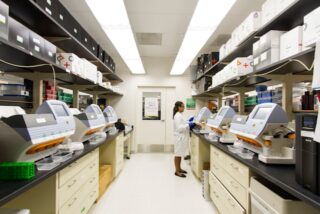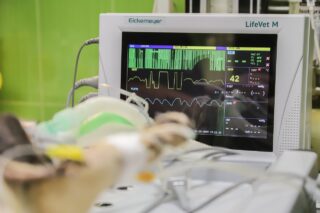
Understanding colon cancer can be a tricky task. How do you know what to look for? Should you get tested for colon cancer even if there are no symptoms? With more and more people developing colon cancer every year, understanding colon cancer is key to preventing it from progressing into a fatal disease. This article will walk you through everything you need to know so what you do know is correct, precise, and accurate.
What is Colon Cancer?
Colon cancer is a disease that starts in the colon or rectum. The colon is the last part of your digestive tract, and the rectum is the end of your large intestine.
The colon and rectum are part of your digestive system, which takes food and breaks it down into smaller amounts that can be absorbed into your bloodstream. Colon cancer begins when cells in the lining of the colon or rectum begin to grow out of control. These cells form a mass called a tumor. Tumors may be benign (noncancerous) or malignant (cancerous).
A malignant tumor can invade nearby tissues and spread to distant sites in the body through lymph nodes and blood vessels. If not contained by surgery, metastases often lead to death from colon cancer.
What are the Symptoms of Colon Cancer?
Colon cancer is the fourth most common cancer in the United States, but it’s also one of the most preventable. It’s essential to be aware of the symptoms of colon cancer and take action if you think you have it.
Colon cancer symptoms
The symptoms of colon cancer vary by person. Some people don’t have any signs or symptoms until their disease has progressed too far for treatment to be effective. If a doctor finds a polyp during a screening exam, you may not experience symptoms until the polyp turns into cancer or another problem develops from its presence.
Common symptoms include:
- Blood in your stool (feces)
- Itching around the rectum or anus
- Pain in your abdomen or rectum that doesn’t go away after eating or passing stool
- Change in bowel habits
- Indigestion
- Bloating and gas
- Rectal bleeding (bright red blood)
How is Colon Cancer Diagnosed?
Colon cancer is diagnosed with a combination of tests, including:
Blood Tests
Three main types of blood tests can be used to detect colon cancer:
A blood test called CA19-9 is a good indicator of inflammation in the body and is often elevated in people with colon cancer or polyps. This test is also used to monitor patients who have had surgery for colon cancer.
Anemia (low red blood cell count) may indicate that your intestines are bleeding, which can signify colon cancer.
Cholesterol levels may rise if you have advanced cancer in the small intestine, which can cause blockages that lead to intestinal bleeding.
CT Scan (computed tomography)
A CT scan uses a computer and special X-rays to create images of the inside of your body. The CT scan can show how far cancer has spread and other conditions that may be causing your symptoms.
Your doctor may also order a colonoscopy to check for precancerous growths, polyps, or other abnormalities. This test involves looking at the lining of your colon with a thin, flexible tube called a colonoscopy.
Endoscopy with biopsy
A colonoscopy is an endoscopic procedure to look inside the colon (large intestine). It’s the most effective way to diagnose and prevent colorectal cancer, as well as other conditions of the colon, such as polyps and inflammatory bowel disease.
Colonoscopy is a safe procedure done by a gastroenterologist. The scope is inserted into your rectum, then pushed through the entire length of your colon (about 5 feet long), providing a view of any abnormal tissues along the way. A biopsy may be taken during this procedure if necessary.
Colonoscopy can also help diagnose other gastrointestinal problems such as Crohn’s disease or ulcerative colitis, diverticulitis, and hemorrhoids.

Imaging tests
Imaging tests can help find signs of colon or rectal cancer in the body. These include:
- Ultrasound: Sound waves are used to create pictures of the inside of your body. This test can show any mass changes in your colon or rectal area. It is also helpful in checking for bowel obstructions that may require surgery.
- Colonoscopy: A long flexible tube (endoscope) with a light and camera on end is inserted into your rectum to look at the lining of your colon and remove small samples (biopsies) for testing if necessary. The procedure typically takes about 30 minutes and requires general anesthesia or sedation so that you’re asleep.
Is Colon Cancer Hereditary?
Colon cancer is not hereditary. But your risk for developing this disease can increase if you have a family history of colon cancer or polyps; you may have an increased risk of the illness. Genetic and lifestyle factors most often cause colon cancer.
The following are some risk factors that can increase your chances of developing colon cancer:
- Age. Colon cancer is more common in people over age 50.
- Obesity. People who are overweight or obese have an increased risk of colon cancer and other digestive tract cancers.
- Family history. Having a parent or sibling with colon cancer increases your chances of developing the disease by three times compared to those without such a family history.
- Smoking tobacco and drinking alcohol in excess can also raise your risk.
How Long Does it Take to Recover from a Colonoscopy?
It’s a relatively simple procedure, but it can take a few hours to a few days to recover.
You may need to take it easy for a few days after colonoscopy. Most people can return to their normal activities within a day or two.
Call your doctor immediately if you have any bleeding or discomfort after the procedure. You may need pain medicine or antibiotics.
Remembering your colonoscopy appointments is a critical way to keep yourself safe. While most people find the test uncomfortable and inconvenient, it’s worth it. Colon cancer develops slowly and is easily treatable if caught early. However, it can grow so large that it takes over organs in the body and kills a person before they even know something is wrong, so getting screened for the cancer is crucial.







